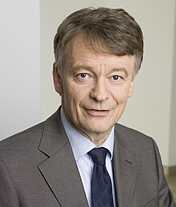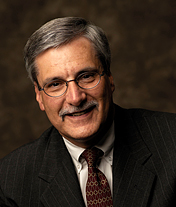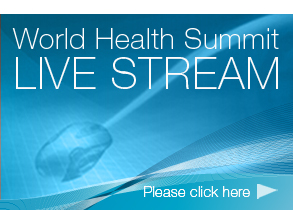Head
Newsletter No. 7
Berlin, October 15th, 2011
Headline
Summit 2011
World Health Summit 2011 | October 23rd-26th, 2011 | Berlin, Germany


Last Minute Reg
Last Minute Registration online or onsite at the registration desk! Click <link registration participant-registration _blank internal-link internal link in current>here for further information.
Speaker Update
Speaker Update
Confirmed Keynote Speakers



Prof.Dr. Hermann Requardt is a member of the Managing Board of Siemens AG and Chief Executive Officer of the Healthcare Sector. After completing his studies in physics and philosophy at the Darmstadt University of Technology and Johann Wolfgang Goethe University/Frankfurt and receiving a doctorate in biophysics, he worked at the Institute of Aerospace Medicine at the German Aerospace Center. In 1984 he joined the Medical Technology Group of Siemens AG, where he was responsible for projects in the Magnetic Resonance division. He was appointed head of the division in 1995. From 2001 to 2006, as a member of the Executive Management of the Medical Solutions Group, he was responsible for several areas, including technological development. In 2006 he became a Member of the Siemens Managing Board and head of Corporate Technology. He was appointed as the Sector Healthcare CEO in 2008. Since 2006 he is an honorary professor in physics of the Johann Wolfgang Goethe University.
Hermann Requardt will speak at the following sessions:
Keynote Lecture
Monday, October 24th, 2011
9.00-10.00
bell
In her role as Associate Dean Research (Clinical, Public and Allied Health), Associate Professor Robin Bell assists the Deputy Dean Research in ensuring that the Faculty is recognised nationally and internationally for research excellence. This involves providing leadership in all aspects of clinical, public and allied health research, developing and implementing plans to increase the Faculty's performance in attracting external research income, and undertaking strategic planning of research priorities, targets and programs.
Her primary appointment is as Deputy Director of the Women's Health Program, Monash University, in the Department of Medicine at the Alfred Hospital. She also has a fractional appointment within the Monash Department of Epidemiology and Preventive Medicine, from which she co-ordinates the teaching of population health in the first year of the MBBS program. She is passionate about this educational role, as well as her work in teaching quantitative analytical skills to higher degree students.
Robin's research interests include all health issues affecting the lives of women, particularly the health of women at mid-life and beyond. The Women's Health Program has active research projects investigating various aspects of cognitive function, breast cancer, sexual function, joint health, and urinary incontinence. The program has a wide range of collaborative relationships at the Alfred hospital site and at other Monash campuses.
Robin Bell will speak at the following session:
M8 Alliance Symposium
A Healthy Start to Life - The Importance of the Right Start
Wednesday, October 26th, 2011
12:00-13:30
Dr. Klag is Dean of the Johns Hopkins Bloomberg School of Public Health, the oldest and largest independent graduate school of public health in the world. He is chair of the Association of Schools of Public Health and chair of the NIH Advisory Board on Clinical Research.
Dr. Klag is a renowned chronic disease epidemiologist whose scientific contributions have been in the prevention and epidemiology of kidney disease, hypertension and cardiovascular disease. He was one of the earliest investigators to apply epidemiologic methods to the study of kidney disease. From 1988 until 2011 he directed one of the longest running longitudinal studies in existence, the Precursors Study, which began in 1946. Dr. Klag is the author of over 200 publications and was the Editor-in-Chief of the Johns Hopkins Family Health Book.
Dr. Klag earned his medical degree at the University of Pennsylvania and his MPH degree from the Johns Hopkins School of Hygiene and Public Health. Prior to his current position, Dr. Klag was formerly on the faculty in the Johns Hopkins School of Medicine where he was Director of the Division of General Internal Medicine and the first Vice Dean for Clinical Investigation.
Michael Klag will speak at the following sessions:
Keynote Lecture
Monday, October 24th, 2011
9.00-10.00
Partner Symposium
Role of Germany in Global Health
Tuesday, October 25th, 2011
7.15-8.45
Keynote Lecture
Wednesday, October 26th, 2011
9.00-10.00
Program Highlights
Program Highlights
Panel Discussion and Partner Symposia
Transitioning Healthcare Systems
Evidence to Policy Linkages - Today's Evidence-Tomorrow's Agenda
Access to Advances in Biotheapies: Scientific, Economic and Social Issues
Partner Symposium on Oct. 24th
14.00-15.30
The transition of healthcare systems and the multi-partnering approach are intensely debated. The multi-partnering approach offers a possible solution to the challenges faced by healthcare systems across the globe. Low birth rates, combined with longer life expectancy contribute to aging societies that place greater demands on healthcare systems.
To overcome these challenges, we need a healthcare infrastructure that provides optimized and affordable care and sustainable solutions. Technical innovations and collaboration beyond traditional segments are necessary to optimize structures as well as processes. This includes a balanced cooperation between payers, providers, diagnostics, pharmaceutical industries, and the patients, which can enable more people to lead healthy, high-quality lives well into old age.
The panel discussion addresses the transition of healthcare systems and the multi-partnering approach and thoroughly conducts a review with different stakeholders. How can we improve efficiency and care? How can we keep costs in check? How can multi-partnering ensure a sustainable healthcare offering? How can different stakeholder groups speed up the development of joint solutions?
Cord Staehler, Siemens Healthcare`s CTO will begin with a short introduction to open up the discussion.
Panelists:
Hermann Requardt, Chief Executive Officer at Siemens Healthcare
Dennis A. Ausiello, Jackson Professor of Clinical Medicine at Harvard Medical School, Chief of Medicine at Massachusetts General Hospital, and Chief Scientific Officer of Partners Healthcare
Farhad Riahi-Nejad, Head of Healthcare Systems at Novartis International AG
Hal Wolf, Sr. Vice President and Chief Operating Officer, Kaiser Permanente, The Permanente Federation
Chaired by healthcare journalist and consultant Uwe K. Preusker, they will discuss this multi-partnering approach and offer different perspectives with regard to joint solutions.
Panel Discussion Session on Oct. 26th
10.15-11.45
In an ideal world, scientific evidences should be routinely used and translated into more effective and equitable political and government action to improve public health. This is especially important for developing countries which have to struggle with limited resources and competing priorities. In reality, however, strengthening the link between evidence and policy is often a difficult challenge and many barriers need to be overcome.
Experiences will be presented at this session which range from:
1. the establishment of a national health technology assessment agency in Thailand - an important tool for policy makers in making rational health resource allocation decisions in accordance with the needs of society;
2. implementation research in 7 developing countries in Asia, Africa and Latin America which expeditiously changed national policy for scaling-up the rapid diagnosis of congenital syphilis;
3. a public-private development partnership in Botswana which used evidence to enhance national responses to HIV/AIDS
Contributions from panelists representing government, academia and international organizations will help to identify the barriers (and also the drivers) for strengthening links between evidence and policy, and also the important lessons which can be used to inform future efforts in this important area.
Chairs:
Tikki Pang | Director of Research Policy and Cooperation | World Health Organization | Switzerland
Hoda Rashad | Director and Research Professor of the Social Research Center | American University in Cairo | Egypt
Panelists:
Yot Teerawatananon | Director of the Health Intervention and Technology Assessment Program | Ministry of Health | Thailand
Patricia Garcia | Director of the Unit of Epidemiology, STI and HIV | Universidad Peruana Cayetano Heredia | Peru
Hoda Rashad | Director and Research Professor of the Social Research Center | American University in Cairo | Egypt
Anette Widmann-Mauz | Parliamentary State Secretary | Federal Ministry of Health | Germany
Partner Symposium on Oct. 26th
10.15-11.45
This joint DKFZ-Inserm session aims at addressing the question how scientific progress and access to new therapies can be efficiently linked. Unfortunately, the transfer of promising results from the laboratory into innovative therapies, diagnostic tools or preventive measures still takes too long.
The question will be addressed how access to advances in new therapies can be increased and what impact increased access may have on the society as a whole.
Chairs:
Otmar D. Wiestler | Chairman and Scientific Member | German Cancer Research Center | Germany
André Syrota | Chairman and CEO | Inserm | France
Speakers:
Alain Fischer | Head of Inserm/Paris Descartes University research unit 768 | Inserm | France
Christof von Kalle | Director, NCT & Professor and Chairman, DKFZ Heidelberg | NCT/ DKFZ | Germany
Ulrik Ringborg | Professor emeritus of Oncology | Karolinska Institutet | Sweden
Theresa Marteau | Director, Behaviour and Health Research Unit | University of Cambridge | United Kingdom
Webstreams
Main Sessions live online!
World Health Summit Live Streams can be watched online in section "Press & Media".

Network
Network
Access to Reproductive Health Supplies – Challenges, Barriers and Opportunities in Developing Countries
Partner Symposium on Oct. 23rd, 16.45-18.15
Availability of reproductive health (RH) supplies plays a critical role in achieving universal access to sexual and reproductive health services and information, which is fundamental to improving health and effectively fighting poverty.
However, in the developing world, the availability and accessibility of RH supplies, such as contraceptives and condoms, as well as tools for safe delivery and medicines for prevention and treatment of sexually transmitted infections and HIV/AIDS, do not meet current demands. Despite an increased demand for these RH supplies, donor support is declining or stagnating in many countries and many national governments have not prioritized RH in their strategies yet. The lack of access to family planning (FP) supplies is a key driver of the more than 60 million annual unintended pregnancies worldwide and high maternal mortality rates throughout the developing world. Challenges related to these problems are: limited resources and donor coordination at national level; the new development aid environment shifting responsibilities and priority setting to recipient countries, as well as weak health systems and supply chains, but also low acceptance of several modern FP methods. In the symposium at the World Health Summit 2011, high-level speakers from politics, civil society and multilateral institutions will discuss these challenges at national and global level and why investing in RH supplies and FP pays off.
The symposium is organized by DSW (Deutsche Stiftung Weltbevoelkerung), an international development and advocacy organisation. With a headquarters in Hanover, Germany, the non-governmental organisation maintains four country offices in Ethiopia, Kenya, Tanzania and Uganda, as well as liaison offices in Berlin, Germany and Brussels, Belgium. DSW aims to empower young people and communities in low- and middle-income countries by addressing the issues of population dynamics and by improving health as a way to achieve sustainable development.
Chairs:
Mercedes Mas de Xaxas | Consultant | Population Action International | Spain
Speakers:
Renate Baehr | Executive Director | Deutsche Stiftung Weltbevölkerung (DSW) | Germany
Morten Sorensen | Deputy Chief, PSB | UNFPA | Denmark
Christopher J. Elias | President and CEO | PATH | United States
Sharon L. Camp | President and CEO | Guttmacher Institute | United States
Joachim Schmitt | BMZ, Division Health and Population Policy | Germany
Herbert Mona | Advocacy Manager | Deutsche Stiftung Weltbevölkerung (DSW) | Uganda
John P. Skibiak | Director | Reproductive Health Supplies Coalition | Belgium
Exhibition
Exhibition
“Our Positive Bodies – An Exhibition of Body Maps from Africa, Asia and Europe”
The Body Maps and stories can be experienced in the foyers of the 4th and 5th floor of the conference venue.
“We paint the virus and we paint our ways of staying healthy, of keeping hope alive. We paint what gives meaning to our lives. We tell our stories. When you look at our paintings, we want you to listen with your eyes. And understand with your heart" The Body Map Artists
Body Maps are life-size self portraits which are painted using the outlines of bodies. These personal and powerful pictures of HIV-positive people tell stories about crises, stigma and discrimination but also about support and vitality. The travelling exhibition is all about listening to affected people and understanding them. The use of art therapy allows simple facts to be enlivened with personal stories and cultural contexts. This "ability to experience" HIV provides new insight and promotes the understanding of people living with it. This is a cooperation project from Deutsche Gesellschaft für Internationale Zusammenarbeit (GIZ) GmbH on behalf of the Federal Ministry for Economic Cooperation and Development, Deutsche AIDS-Hilfe e.V., Art2Be and TICAH. People from Africa, Asia and Europe painted the Body Maps.
Program
Publication
Book of Proceedings 2010
Click here to download the Book of Proceedings from the previous World Health Summit in 2010.
Social media
Contact
Contact
Contact
Summit Secretariat
Charité - Universitätsmedizin Berlin
Charitéplatz
110117 Berlin, Germany
Tel.: +49 30 450 572 117
Mail: secretariat(at)worldhealthsummit.org
Contact
Organizing Office
c/o K.I.T Group GmbH
Association & Conference Management Group
Kurfürstendamm 71, 10709 Berlin, Germany
Tel.: +49 30 246 03 240
Mail: registration(at)worldhealthsummit.org
